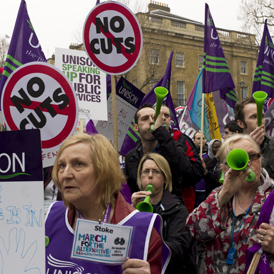Public sector strike still on as talks continue
A strike by up to 750,000 public sector workers is set to go ahead after talks failed to end a bitter dispute over plans to reform pensions.

A walkout on Thursday by teachers, civil servants and other public sectors workers is expected to cause widespread disruption in the row over controversial changes to pensions.
The National Union of Teachers (NUT) estimates that up to 85 per cent of schools will be either partly shut, or will close their doors completely, as staff take to the picket lines.
Talks between ministers and unions leaders on Monday did little to affect Thursday’s planned walkout. Their discussions followed weeks of an increasingly bitter war of words between unions and government ministers over controversial plans to reform public sector pensions.
Members of four trade unions will walk out for 24 hours on Thursday, closing thousands of schools in England and Wales and disrupting Government departments, courts, driving tests and job centres. Their action is in response to Government plans to raise the public sector state pension age to 66 by 2020 and to force people to pay more for smaller pensions.
In a joint statement after this afternoon’s meeting, Cabinet Office Minister Francis Maude and Chief Secretary to the Treasury Danny Alexander insisted the talks had been “constructive”.
The Government did enter into some movement on some issues and there will be a further meeting in July. Brendan Barber
“We believe both sides have a responsibility to see the talks through and we would urge public workers not to strike while they are ongoing,” the statement said.
But the Public and Commercial Services Union’s General Secretary Mark Serwotka said: “It was disappointing that the meeting proved to be no different to any of the others – it was a farce.”
TUC General Secretary Brendan Barber said there was still a “major gap” between the two sides on plans to increase the pension age, raise contributions and change the way pensions are determined.
“The Government did enter into some movement on some issues and there will be a further meeting in July,” he said.
“This is a serious process which we are committed to, because we want to try to reach an agreement.”
On Sunday Education Secretary Michael Gove warned teachers that they risked damaging their professional reputations with the planned walkout.
Mr Gove said the Government was doing everything possible to keep schools open despite the “militancy” of the unions.
One of the union negotiators said today’s talks were “fraught with difficulties”, while Mr Maude said it was “disappointing” that a strike had been called for this week while negotiations were continuing.
Unison leader Dave Prentis has warned that his union will ballot over a million workers for industrial action if the dispute is not resolved, predicting that walkouts in the autumn would be the biggest since the 1926 General Strike.
Union officials believe that Danny Alexander, the Chief Secretary to the Treasury, will be keen to take some of the heat out of the dispute after he sparked anger with a recent speech making it clear that the government was pressing ahead with plans to make public sector workers pay more into their pensions and work longer.
The Government said the current talks will continue into July, while unions want to have separate negotiations to discuss plans for different pension schemes across the public sector.
Thursday’ strike will involve members of the National Union of Teachers (NUT), the Association of Teachers and lecturers (ATL), the University and College Union (UCU) and the Public and Commercial Services union, although students, campaign groups and other activists are also planning action including marches and protests.
Kevin Courtney, deputy general secretary of the National Union of Teachers (NUT), and one of those representing teaching unions at today’s meeting, said: “What we are looking for is some sign that the Government is prepared to move on the three central issues – paying more, working longer and getting less.”
